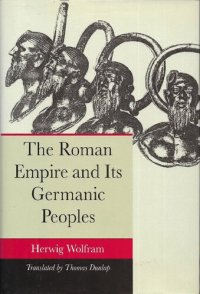
Ebook: The Roman Empire and Its Germanic Peoples
Author: Herwig Wolfram
- Genre: History
- Year: 1997
- Publisher: University of California Press
- City: Berkeley
- Language: English
- pdf
Translated by Thomas Dunlap.
Originally published as "Das Reich und die Germanen", 1990 Wolf Jobst Siedler Verlag GmbH, Berlin
The names of early Germanic warrior-tribes and leaders resound in songs and legends, and the real story of the part they played in transforming the ancient world is no less gripping. Herwig Wolfram’s panoramic history spans the great migrations of the Germanic peoples and the rise and fall of their kingdoms between the third and eighth centuries, as they invaded, settled in, and ultimately transformed the Roman Empire.
We know at the start, from the accounts of Tacitus and other Romans, that the Germanic peoples spread across all of northern and central Europe east of the Rhine and north of the Danube. Some already lived within the empire’s boundaries, but they nonetheless shared a common social structure and culture, even a common language. Over the centuries, as Germanic military kings and their fighting bands created kingdoms and won political and military recognition from imperial governments through alternating confrontation and accommodation, the tribes became sharply differentiated. They acquired their own regions and their own histories, which blended with the history of the empire. The Goths in their complicated relationship with Huns as well as Romans, Ostrogoths and Vandals, Franks and Visigoths, the kingdoms of Toulouse and Burgundy, and the Longobards who made northern Italy their own—all interacted with Roman politics and the Christian religion and transformed Roman society as much as they were transformed by it.
Wolfram acknowledges the other outside forces that contributed to the end of the Roman world of antiquity: Arabs conquered the entire southern half of the Roman Empire; Avars, Persians, and above all Slavs brought transformation in the east. But north and west of the Mediterranean it was the migrating Germanic tribes that changed Rome irrevocably. In Wolfram’s words, 'the Germanic peoples neither destroyed the Roman world nor restored it; instead, they made a home for themselves within it.' As a result, the empire was economically and culturally provincialized even as its geographical and ethnographic horizons were expanded. Tribal and imperial practices and traditions merged in varying ways and to varying degrees.
Originally published as "Das Reich und die Germanen", 1990 Wolf Jobst Siedler Verlag GmbH, Berlin
The names of early Germanic warrior-tribes and leaders resound in songs and legends, and the real story of the part they played in transforming the ancient world is no less gripping. Herwig Wolfram’s panoramic history spans the great migrations of the Germanic peoples and the rise and fall of their kingdoms between the third and eighth centuries, as they invaded, settled in, and ultimately transformed the Roman Empire.
We know at the start, from the accounts of Tacitus and other Romans, that the Germanic peoples spread across all of northern and central Europe east of the Rhine and north of the Danube. Some already lived within the empire’s boundaries, but they nonetheless shared a common social structure and culture, even a common language. Over the centuries, as Germanic military kings and their fighting bands created kingdoms and won political and military recognition from imperial governments through alternating confrontation and accommodation, the tribes became sharply differentiated. They acquired their own regions and their own histories, which blended with the history of the empire. The Goths in their complicated relationship with Huns as well as Romans, Ostrogoths and Vandals, Franks and Visigoths, the kingdoms of Toulouse and Burgundy, and the Longobards who made northern Italy their own—all interacted with Roman politics and the Christian religion and transformed Roman society as much as they were transformed by it.
Wolfram acknowledges the other outside forces that contributed to the end of the Roman world of antiquity: Arabs conquered the entire southern half of the Roman Empire; Avars, Persians, and above all Slavs brought transformation in the east. But north and west of the Mediterranean it was the migrating Germanic tribes that changed Rome irrevocably. In Wolfram’s words, 'the Germanic peoples neither destroyed the Roman world nor restored it; instead, they made a home for themselves within it.' As a result, the empire was economically and culturally provincialized even as its geographical and ethnographic horizons were expanded. Tribal and imperial practices and traditions merged in varying ways and to varying degrees.
Download the book The Roman Empire and Its Germanic Peoples for free or read online
Continue reading on any device:

Last viewed books
Related books
{related-news}
Comments (0)